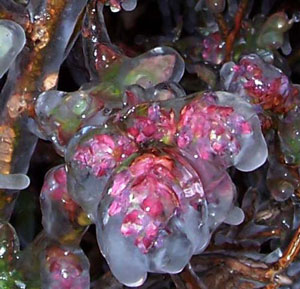Dear Florida Climate Center Friends,
We'd like to present you with the January 2014 edition of our newsletter. In this newsletter, you'll find our monthly climate summary, a list of special events that our staff attended, an example of a data request made to the office, and more. If you have any questions, please email us at climate@coaps.fsu.edu.
Thanks,
The Staff of the Florida Climate Center
 |  |  | David Zierden
State Climatologist | James O'Brien
Professor Emeritus | Melissa Griffin
Asst. State Climatologist |
|
December Climate Summary for Florida
|
|
Climate Exhibit at Alabama Farmers Federation Meeting
The Alabama Farmers Federation held their ninety-second annual meeting in Montgomery, Alabama, last month on December 5th and 6th. State Climatologist David Zierden joined Extension Specialist Brenda Ortiz and others from Auburn University in running a display booth on climate and agriculture. There they discussed with farmers how climate information and forecasts are used to manage risks and take advantage of favorable opportunities due to changing weather and climate patterns. Tools and background information available on the AgroClimate.org decision support system were demonstrated live on computer displays.
|
|
State Climatologist Warns of Damaging Freezes
University of Florida Extension in Lake County held their annual winter weather school at the Agricultural Center in Tavares, Florida, on December 10th. Experts gave presentations on weather information and cold protection tools available through the Florida Automated Weather Network (FAWN) and AgroClimate.org. Chris Oswalt demonstrated the different types of freezes impacting the state and how farmers should use irrigation properly for cold protection under the different scenarios. State Climatologist David Zierden presented a winter climate outlook, highlighting what kinds of weather and climate patterns we can expect given neutral conditions in the Pacific Ocean. Neutral conditions lead to a more variable winter with swings between warmer, colder, wetter, and drier periods. The neutral phase also corresponds to an increased risk of damaging freezes and intrusions of cold, Arctic air masses.
|
|
Asst. State Climatologist Out in Local Community
On the first Monday of December, Ms. Griffin gave 45-minute and 90-minute presentations to 5th grade students at a Leon County elementary school. Her talks covered the basics of weather that are taught in the weather, climate and water cycle science curriculum. Students took part in a variety of hands-on activities and observed demonstrations on cloud formation, thermal winds, Bernoulli's Principle, and atmospheric pressure.
|
|
Example Data Request
A hydrologist with the St. Johns River Water Management District (SJRWMD) contacted the Florida Climate Center in early December inquiring about data on the mean number of freezes in the Daytona Beach area. A new permit for a blueberry farm had been received by SJRWMD and the hydrologist was in the process of determining the water allocations for freeze protection for the fruit. The Climate Center was able to provide the hydrologist with information on return frequencies on various critical freezing temperature thresholds that would require extended water usage to protect the blueberries.
 | | Blueberries. Credit: Brookside Farms |
|
|
About Us
The Florida Climate Center is part of a three-tiered system of national, regional, and state climate offices, including NOAA's National Climatic Data Center and the Southeast Regional Climate Center. The Florida State Climatologist and other staff at the Florida Climate Center provide the following information and services to the people of Florida:
· Climate Data:
Historical weather observations for weather stations throughout the state of Florida. We are able to provide data for most stations from 1948-present.
· Climate Information:
Long-term historical averages for various stations, climate divisions, and the entire state.
· Extreme Event Records:
Information and analyses on extreme events such as freezes, droughts, floods and hurricanes.
· Special Analysis:
With their vast knowledge of El Niņo, La Niņa and climate variability, the State Climatologist and staff can offer expert insight into Florida's climate trends.
· Outreach:
Activities, presentations, and workshops that inform and educate the people of Florida about current and emerging climate issues. We also coordinate volunteers for the Community Collaborative Rain, Hail & Snow Network (CoCoRaHS).
More About Us
|
|